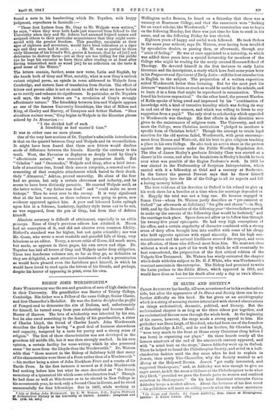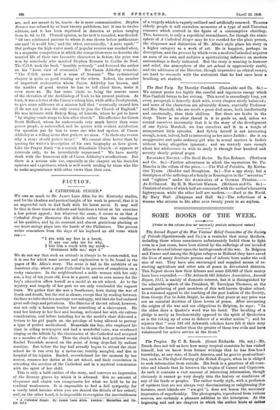IN SLUMS AND SOCIETY.*
Ca.sorr ADDERLEY has hardly, till now, accustomed us to his ecclesiastical title, but after the appearance of In Slums and Society there can be no further difficulty on this head. He has given us an autobiography which is a string of amusing stories intermixed with shrewd observations on things ecclesiastical, dramatic, political, and literary. But the ecclesiastical chapter is as long as the three others put together, and an ecclesiastical flavour runs through the whole book. At the beginning of his career, however, the stage made a strong appeal to him. His godfather was Dean Leigh, of Hereford, who had been one of the founders of the Cambridge A.D.C., and he and his brother, Sir Chandos Leigh, "were very much to the front at Hams every Christmas (long before I was born) in organizing our playa." On them boards nearly all the famous amateurs of the end of the nineteenth century appeared, and with "a mind bent on the stage," James Addcrley went up to Oxford. There he helped to found the Philothespian Society, and acted in a half- clandestine fashion until the day came when he had to explain to Jowett, then newly Vice-Chancellor, why the Society wanted to act Money at the Holywell Rooms. Jewett "got really interested, and suggested Shakespeare," and, as Addcrley was wise enough to give an eager assent, he left the room with leave to the Philothespians to do what they liked, "provided we gave the female parts to women and confined ourselves to Shakespeare." On his later theatrical triumphs Canon Adderley keeps a modest silence. About the fortunes of his first novel
his publishers will insist on calling novels what the author maintains
• in Slums and Society. By James Adderley, Hon. Canon of Birmingham. London; 'I. Fisher Umon. L64.1 are, and are meant to be, tracts—he is more communicative. Stephen Remarx was refused by at least twenty publishers, but it ran to twelve editions, and it has been reprinted in America at prices ranging from 3s. 6d. to Id. Clerical opinion, so far as' it is recorded, was divided- " Of two celebrated 'parsons to whom it was shown before publication, one said 'it would bite,' and the other, sarcastically, 'A mere squib.'" But perhaps the high-water mark of popular success was reached when, in a magazine competition in which the competitors were to describe the married life of their two favourite characters in fiction, the prize was won by somebody who married Stephen Remora to Cecilia de Noel. The C.O.S. took the book "horribly seriously" and lectured the author on his "loose view of economics." But Canon Adderley remarks: "The C.O.S. never had a sense of humour." The ecclesiastical chapter is quite as good reading as the others. Indeed, the number of important ecclesiastics whom Canon Adderley has known, and the number of good stories he has to tell about them, make it even more so. He has some claim to being the remote cause of the elevation of the Archbishop of York to his present position. At least, it was a letter of the Canon's asking him, while still a Presbyterian, to give some addresses at a mission hall that "eventually caused him (I do not say it was the only cause) to join the Church of England." He was intimate with Bishop King, of Lincoln, whom he got to lumw "by singing comic songs to him after church." His affection for Canon Scott Holland, whom he understands very much better than some graver people, is unbounded, and he quotes with evident satisfaction the question put by him to some one who had spoken of Canon Adderley as a rolling-stone that gathers no moss. "Is there any reason why a stone should gather moss ? " We cannot close better than by quoting the writer's description of his own biography as here given. Like the Prayer Book "in a certain Ritualistic Church—it appears at intervals only, to be immediately suppressed." We have mostly dealt with the humorous side of Canon Adderley's recollections. But there is a serious side too, especially in the chapter on his Socialist opinions and experience, which is well worth reading by those who like to make acquaintance with other views than their own.



























 Previous page
Previous page